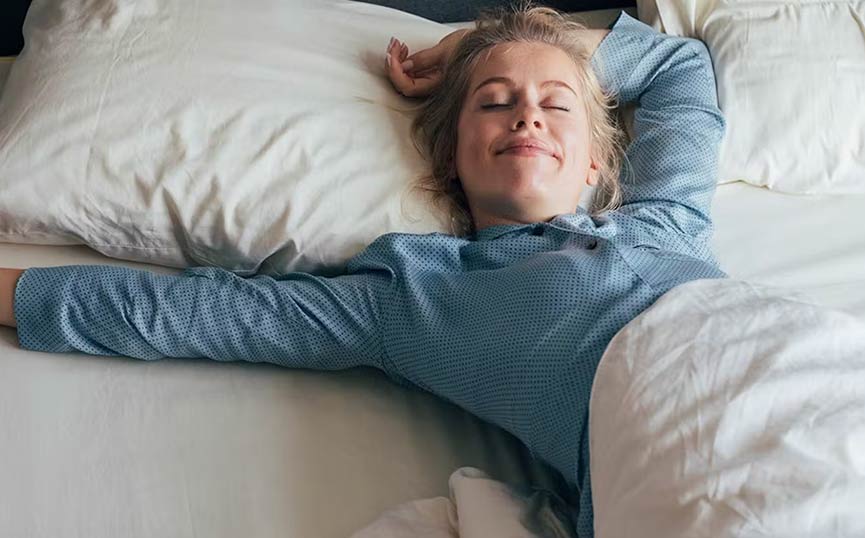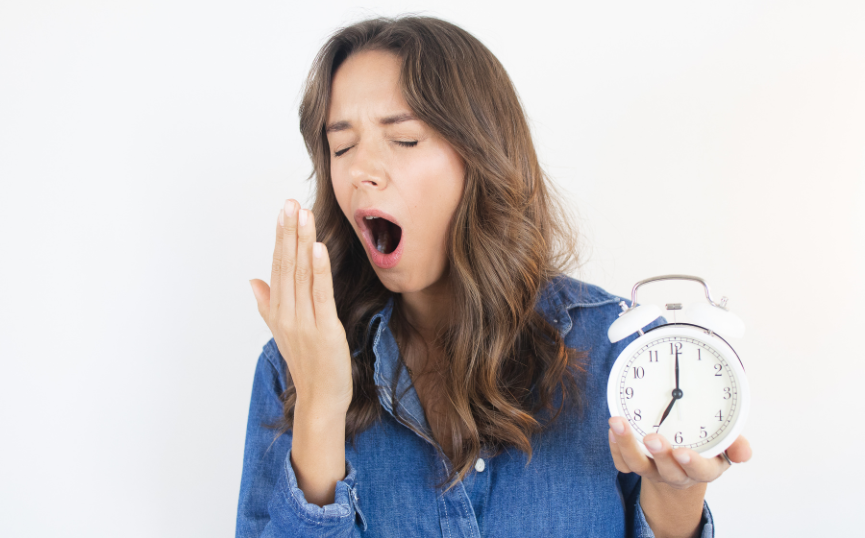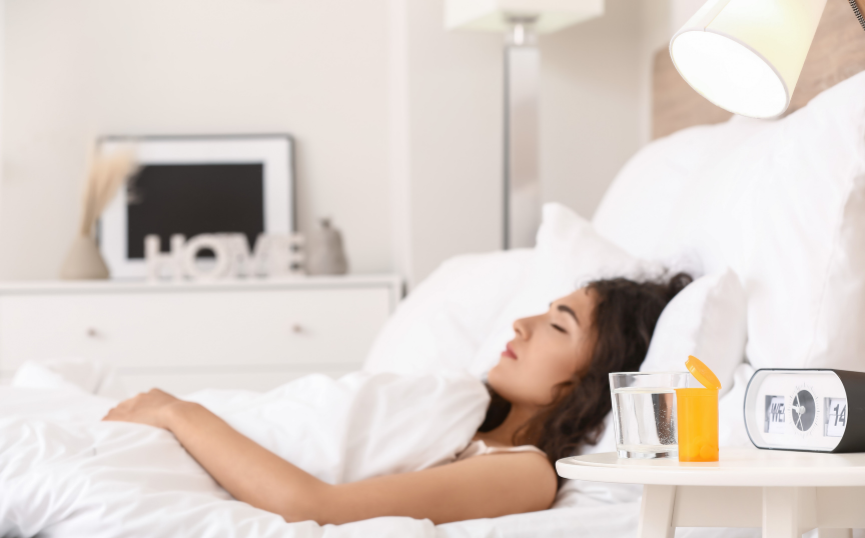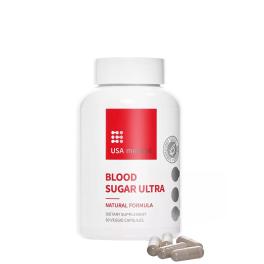What is melatonin good for and how does it help to support sleep?
Melatonin, as a natural sleep hormone, is growing in popularity. Between 1998 and 2018, the number of people taking melatonin preparations nearly quadrupled28, and by 2024, it was more popular than ever. At the same time, the number of taking extra high levels of 10-20 mg melatonin has also increased. Sleep problems can make everyday life more difficult and drastically reduce quality of life. Anyone who has suffered from some form of sleep deprivation knows that it’s like to be exhausted in the morning and then have it last all day: you’re tired from all the obligations, only to toss and turn in bed at night instead of sleeping. Insomnia and overnight sleep difficulties are a vicious circle that is difficult to break free from, but not impossible! In fact, I should say: it is a vicious cycle to get out of! Are extra high doses of melatonin tablets the solution?

Let this article serve as a guide to help you get the most of your melatonin intake, so you can sleep like a carefree child again! We also discuss the misconceptions and dosage surrounding melatonin use. Have you ever tired melatonin tablets and not had the expected results? We’ll also look at what might have gone wrong that has prevented you from experiencing the effects of melatonin tablets.
What is melatonin good for?
In case there are others who have been living underground; melatonin is a hormone responsible for regulating sleep. In terms of the effects of melatonin; it enhanches the feeling of sleepiness and optimises the quality of sleep. To explain in more detail:
- The hypothalamic brain region plays a major role in the sleep process. The hypothalamus helps to convert serotonin (the happiness hormone) into melatonin.
- Darkness and physical fatigue27 stimulate the production of GABA (our main inhibitory hormone), which makes us „slow down”. Everyone has experienced what it’s like to be tired in the evening – your muscles relax, your brain dulls and your reaction time slows down – well, it’s the hormone GABA!
- The hormone GABA will stimulate the part of our brain responsible for circadian rhythm (the rhythmic regulation of sleep) (the pineal gland) to start producing more melatonin.
In simple terms: darkness triggers a signal in the hypothalamus that triggers GABA production. The hormone GABA activates the pineal gland, which will produce melatonin from serotonin1.
So melatonin could be called, funnily enough, the vampire hormone, because it is only produced in the dark, but when it is released from the pineal gland the brain quickly fills up with it. When it kicks there is quickly enough melatonin, it just might be the wrong time to kick in. This is why it is worth remembering that if you have tried melatonin without success, the solution is not to increase the dosage first. Melatonin should be seen as a sleep aid rather than a sleeping pill. In other words, melatonin tablets can help you adjust your circadian rhythm and improve the quality of your sleep. Let’s look at this in more detail!
Melatonin is not a sleeping pill! What is melatonin really for?
It takes time for the melatonin tablets to take effects. So it doesn’t work best when used half an hour before sleep. If you use it shotly before bedtime, it will probably start to work in the early hours of the morning, which means you may wake up feeling more tired and discouraged in the morning. According to Dr. Ilene M. Rosen, a sleep medicine researcher, „it can take hours for melatonin to take effects”2.
Because our brains produce melatonin, insomnia in general is not directly caused by a lack of melatonin, but by excessively high levels of cortisol (the stress hormone), which disrupts circadian rhythms. Of course, in insomnia, melatonin levels reduced, which makes it harder to fall asleep, but this is due to stress hormones! More specificially: cortisol blocks GABA production and disrupts the natural rhythm of our sleep (the circadian rhythm). Our sleep works more efficiently when it follows our circadian rhythm from day to day (and yes, this includes a short rest, which neuroscientists also agree3). There is no greater regulator of melatonin production than the rhythmic alternation of night and day. Excessive levels of cortisol, on the other hand, cause fatigue-wakefulness surges out of rhythm, disrupting our circadian rhythms. For this reason, melatonin should be seen as a fine-tuning tool that can reset your natural sleep cycle. Studies have shown that melatonin can also help to reset our circadian rhythms23-25.
In addition, the other stress hormone: adrenaline directly prevents sleep onset through its pulse-raising effects. So excessive stress is not good for sleep! So for melatonin to work at its best, stress needs to be addressed first (through lifestyle changes and even the use of supplements). But first, let’s look at the proven effects of melatonin.
A total of 19 studies4 (involving 1,683 people) found that people fell asleep 7 minutes earlier and slept 8 minutes longer on average. This may not seem like a lot, but let’s not forget that these are averages with much greater individual variation.
Highlighting some promising results:
- One study looked at 118 healthy nurses working multiple shifts. The results were as follows: 5 mg of melatonin 30 minutes before bedtime improved sleep quality10.
- A study of 160 regular travellers found that 5 mg of melatonin can reduce the symptoms of jet lag11. A similar study also looked at the effect of 5 mg of melatonin. It was used for 4 days after travel with 320 travellers and found similar results. In other words, the use of melatonin tablets can reduce the symptoms of jet lag: it can help to adapt to jet lag and thus energise you in the days following a tiring journey12.
- A convincing clinical study (involving 791 people with sleep disturbance) reported that melatonin tablets with a prolonged absorption time of 2 mg 1-2 hours before sleep reduced sleep disturbance symptoms and increased sleep duration9.
So, now we know how melatonin works and what we can expect from it in terms of sleep, but do we understand why it is good for us?

Why do we sleep at all?
You’ve probably wondered how much time we could save by skipping sleep, but our bodies are designed to work best with sleep. Of course, we haven’t shared any fresh information with you, but maybe we can write something new! Spoiler: you don’t have to sleep at least 8 hours to be healthy and fit!
Sleep functions:
- It is during sleep that learning takes place. This is known as memory consolidation5.
- During sleep, a huge amount of growth hormone6-8 is produced. Sleep is of particular importance in the recovery from a variety of tissue-damaging diseases (e.g. joint problems, physical injuries and autoimmune diseases).
- Serotonin (the happiness hormone) is also produced during sleep6-8. Therefore quality sleep can help to manage stress (by optimising cortisol levels) and will increase feelings of motivation and mood in the morning.
- Dreams also have a function: they „prepare you for possible situations”. In this way, dreaming a sleep itself helps to develop situational awareness.
- The effects of sleep deprivation:
- Reduced mental and physical performance
- Lack of motivation, lethargy and depression
- Learning difficulties
There are two basic stages of sleep:
- E.M.: rapid eye movement.
- Non-R.E.M.: a phase without sudden eye movement. This can be broken down into four other phases, but I won’t go into the details.
The 4 Non-REM and 1 REM phases follow each other. Our sleep becomes restful when we wake up at the end of each of these cycles (when we have completed a full four-phase non-REM and one REM phase). Related studies have confirmed that 3-5 mg of melatonin tablets can increase the length of REM sleep cycles; i.e. increase sleep quality13-14.
The cycle repeats every 1.5 hours on average. So it’s worth setting the alarm to a multiple of 1.5, because there’s a good chance that a full 5 -phase sleep cycle will end. Of course, this does not mean that you should always settle for 1.5 hour of sleep. Because then the overall effect is of course less, but if life is such that you can only sleep for, say, 2 hours, then don’t sleep for two, sleep for 1.5! Another example, if you could sleep 8 hours, it will not be relaxing either, instead choose 7.5 hours! So on and on…
Additional effects of melatonin as an antioxidant
At Vitamin360, we talk about antioxidants all the time, because we can’t stop talking about their importance. Antioxidants have detoxifying (free radical scavenging) and cell regenerating functions. It is precisely because of these properties that antioxidants have general health-promoting properties. And melatonin is considered a particularly potent antioxidant, and melatonin may even enhance other antioxidant activities. In technical terms: it acts synergistically with other antioxidants15-16. Antioxidant…antioxidant…antioxidant! There’s a lot of repetition, but it just goes to show the power of these invisible plant wonders!
So the melatonin can help reduce cell damage, do you know where it’s effective beyond health? For skin renewal! Having fresh and healthy skin cells will result in a firmer and more hydrated face. Naturally, this effect is further enhanced by quality sleep. So melatonin tablet can be considered a true 2 in 1 beauty formula17, 18? Need more?
When does detox and more sleep really come in handy? During an infectious disease! Studies confirm the indirect immune-boosting effects of melatonin19-22. It has been shown to help prevent or improve infectious disease such as COVID-19, influenza, wound infections, fungal infections and others19-22.

Is there organic melatonin in the market?
Bio-melatonin (or phyto-melatonin), or melatonin found in the nature, is derived from the nucleus of plant cells. Although synthetic melatonin is used as a food supplement. But in many cases, synthetic does not mean unhealthy, just as natural does not equal healthy – think of the cyanide in peach pits, a natural compound that is a deadly poison. According to the EFSA, there is a risk of cyanide poisoning above 3 small seeds of half a large seed26. So once again, Paracelsus is right when he said that „the does makes the poison”.
Melatonin dose
Melatonin (bio- and phyto- or not) is one of the best examples of dosage choice! Higher doses will not have any extra effect. In studies we have seen that maximum doses of 5 mg of melatonin tablets were used, but it is worth starting with the lowest useful dose: 0.5 mg. If you’ve tried it and it didn’t work, I’d still like you to start with this, I’ll show you why.
I’ve tried the melatonin pill, but it didn’t work. What’s the problem?
As I mentioned: melatonin should be seen as a very weak sleeping pill that improves the quality of your sleep rather than helping you get much sleep. If you find it difficult to fall asleep or wake up suddenly a lot, there may be something else going on. To help you avoid these, I’d like you to tick off the following list every day for a better night’s sleep:
- Set a blue light filter on your devices. In bed, preferably don’t use your phone anymore, read instead! Don’t try to change the world in the bed at night, you’ve got all day to do it!
- Don’t put off work until the evening! Because when you’ll just sleep restlessly, or worse: take your work to bed and wonder why you can hardly sleep at night? Because your cortisol levels will skyrocket on work nights.
- Avoid big and spicy foods at dinner.
- Do sport, more every day! Get enough exercise so that you’re physically (also) tired when you go to bed at night.
- Take the melatonin tablets (or capsules) 1-2 hours before bedtime, but it’s better to use the extended-release melatonin.
- If you are suffering from general anxiety, try using an adaptogenic herb: lemon or John’s Worth, cat’s worth or rose root. You should also take a more complex supplement such as LIFE EXTENSION ASHWAGANDHA PLUS CALM & FOCUS (60 VEG CAPSULES). Also introduce stress-relieving practices into your life, such as yoga, mantras, meditation and cold showers.
- If you have to pee a lot at night, it could be a sign of prostate problems. Get it checked out and it confirmed, take saw palmetto extract!
- If you get up a lot in the night, it could indicate liver problems or insulin resistance. Get is checked out and if your liver is problematic, take milk thistle! And if your insulin levels are a bit off, reduce your carbohydrate intake and use a blood sugar optimizing supplement at the same time.
Melatonin tablet prices – Best value melatonin tablets on the market!
Melatonin tablet prices vary widely on the market. Of course the price depends on the number of doses and the dosage of the capsules/tablets. The price of extended-release melatonin tablets is more expensive, as are complexes.
Vitamin360’s tip: LIFE EXTENSION MELATONIN 6 HOUR TIMED RELEASE (100 VEG TABLETS). There are stronger versions of this: 750 mcg and 3 mg.
Kiegészítve egy stressz kezelő komplexszel: a LIFE EXTENSION ASHWAGANDHA PLUS CALM & FOCUS (60 VEG KAPSZULA)-val. Supplemented with a stress management complex: LIFE EXTENSION ASHWAGANDHA PLUS CALM & FOCUS (60 VEG CAPSULES).
Both supplements are in the more expensive price range, but are excellent value for money. Again, remember, more melatonin is not always better! See also the Vitamin360 recommendation of 300 mcg (micrograms)! This is far less than most people use. Accompany your use of melatonin (and ashwagandha) with a lifestyle change and you will certainly be sufficient with lower dose melatonin tablets. If the expected effect still does not occur, then slowly increase the dose of extended absorption melatonin up to 3 mg. The dose of normal melatonin: up to 5 mg.
Vitamin360’s recommendations are not a substitute for medical advice, so consult your doctor before starting any supplementation routine!
Used sources
- Tordjman S, Chokron S, Delorme R, et al. Melatonin: Pharmacology, Functions and Therapeutic Benefits. Curr Neuropharmacol. 2017;15(3):434-443.
- https://www.ama-assn.org/delivering-care/public-health/what-doctors-wish-patients-knew-about-insomnia
- Mantua J, Spencer RMC. Exploring the nap paradox: are mid-day sleep bouts a friend or foe? Sleep Med. 2017 Sep;37:88-97. doi: 10.1016/j.sleep.2017.01.019. Epub 2017 Mar 6. PMID: 28899546; PMCID: PMC5598771.
- https://journals.plos.org/plosone/article/metrics?id=10.1371/journal.pone.0063773#citedHeader
- Rasch B, Born J. About sleep's role in memory. Physiol Rev. 2013;93(2):681-766.
- Van Cauter E, Plat L. Physiology of growth hormone secretion during sleep. J Pediatr. 1996 May;128(5 Pt 2):S32-7.
- Portas CM, Bjorvatn B, Ursin R. Serotonin and the sleep/wake cycle: special emphasis on microdialysis studies. Prog Neurobiol. 2000 Jan;60(1):13-35.
- Bjorvatn B, Grønli J, Hamre F, Sørensen E, Fiske E, Bjørkum AA, Portas CM, Ursin R. Effects of sleep deprivation on extracellular serotonin in hippocampus and frontal cortex of the rat. Neuroscience. 2002;113(2):323-30.
- Wade AG, Crawford G, Ford I, McConnachie A, Nir T, Laudon M, Zisapel N. Prolonged release melatonin in the treatment of primary insomnia: evaluation of the age cut-off for short- and long-term response. Curr Med Res Opin. 2011;27:87–98.
- Sadeghniiat-Haghighi K, Aminian O, Pouryaghoub G, Yazdi Z. Efficacy and hypnotic effects of melatonin in shift-work nurses: Double-blind, placebo-controlled crossover trial. J Circadian Rhythms. 2008;6:10.
- Suhner A, Schlagenhauf P, Hofer I, Johnson R, Tschopp A, Steffen R. Effectiveness and tolerability of melatonin and zolpidem for the alleviation of jet lag. Aviat Space Environ Med. 2001;72:638–646.
- Suhner A, Schlagenhauf P, Johnson R, Tschopp A, Steffen R. Comparative study to determine the optimal melatonin dosage form for the alleviation of jet lag. Chronobiol Int. 1998;15:655–666.
- James SP, Mendelson WB, Sack DA, Rosenthal NE, Wehr TE. The effect of melatonin on normal sleep. 1987;1:41–44.
- Nave R, Herer P, Haimov I, Shlitner A, Lavie P. Hypnotic and hypothermic effects of melatonin on daytime sleep in humans: lack of antagonism by flumazenil. Neurosci Lett. 1996;214:123–126.
- Reiter RJ, Tan DX, Mayo JC, Sainz RM, Leon J, Czarnocki Z. Melatonin as an antioxidant: biochemical mechanisms and pathophysiological implications in humans. Acta Biochim Pol. 2003;50(4):1129-46. PMID: 14740000.
- Reiter RJ, Mayo JC, Tan DX, Sainz RM, Alatorre-Jimenez M, Qin L. Melatonin as an antioxidant: under promises but over delivers. J Pineal Res. 2016 Oct;61(3):253-78.
- Kleszczynski K, Fischer TW. Melatonin and human skin aging. Dermatoendocrinol. 2012;4(3):245-252.
- Huether G. Melatonin as an antiaging drug: between facts and fantasy. Gerontology. 1996;42(2):87-96
- Ma Y, Tang K, Zhang C, Zhang Y, Zhang Y, Jin B, Ma Y. [Advances in the role of melatonin in infectious diseases: A review]. Xi Bao Yu Fen Zi Mian Yi Xue Za Zhi. 2019 Jun;35(6):563-568. Chinese. PMID: 31292062.
- Pivonello C, Negri M, Patalano R, Amatrudo F, Montò T, Liccardi A, Graziadio C, Muscogiuri G, Pivonello R, Colao A. The role of melatonin in the molecular mechanisms underlying metaflammation and infections in obesity: A narrative review. Obes Rev. 2022 Mar;23(3):e13390.
- Hu W, Deng C, Ma Z, et al. Utilizing melatonin to combat bacterial infections and septic injury. Br J Pharmacol. 2017;174(9):754-768.
- Boga JA, Coto-Montes A, Rosales-Corral SA, Tan DX, Reiter RJ. Beneficial actions of melatonin in the management of viral infections: a new use for this "molecular handyman"?. Rev Med Virol. 2012;22(5):323-338.
- Vandewalle G, Middleton B, Rajaratnam SM, Stone BM, Thorleifsdottir B, Arendt J, Dijk DJ. Robust circadian rhythm in heart rate and its variability: influence of exogenous melatonin and photoperiod. J Sleep Res. 2007;16:148–155.
- Sadeghniiat-Haghighi K, Aminian O, Pouryaghoub G, Yazdi Z. Efficacy and hypnotic effects of melatonin in shift-work nurses: Double-blind, placebo-controlled crossover trial. J Circadian Rhythms. 2008;6:10. doi: 10.1186/1740-3391-6-10.Rajaratnam SM, Dijk DJ, Middleton B, Stone BM, Arendt J. Melatonin phase-shifts human circadian rhythms with no evidence of changes in the duration of endogenous melatonin secretion or the 24-hour production of reproductive hormones. J Clin Endocrinol Metab. 2003;88:4303–4309.
- Rajaratnam SM, Middleton B, Stone BM, Arendt J, Dijk DJ. Melatonin advances the circadian timing of EEG sleep and directly facilitates sleep without altering its duration in extended sleep opportunities in humans. J Physiol. 2004;561:339–351.
- https://www.efsa.europa.eu/en/press/news/160427
- https://neurosciencenews.com/exercise-depression-gaba-glutamate-3730/
- https://www.nih.gov/news-events/nih-research-matters/use-melatonin-supplements-rising-among-adults






